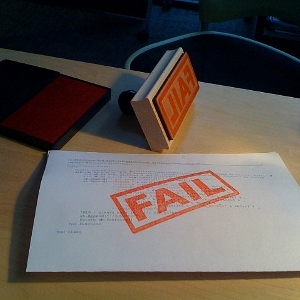Buy a term paper online… or troll
 Teaching Assistants (TAs) frequently trade tips for discovering plagiarism in the papers they grade. While google has made it easy to catch the lazy copy-paste form, many of us recognize that cheaters with financial resources can buy term papers. The following chat occurred on TopMarkEssays.com, an essay mill which charges +$10/page for custom writing and bills itself as “among the premier essay writing companies in the world”.
Teaching Assistants (TAs) frequently trade tips for discovering plagiarism in the papers they grade. While google has made it easy to catch the lazy copy-paste form, many of us recognize that cheaters with financial resources can buy term papers. The following chat occurred on TopMarkEssays.com, an essay mill which charges +$10/page for custom writing and bills itself as “among the premier essay writing companies in the world”.
Operator Henry has joined the chat.
Henry: Hello may I help you
Jay: So… uh… where did your writers go to school? Where’d they get their degrees?
Henry: Why?
Jay: I’m wondering if they used this service to get through their programs and graduate.
Henry: May I know why you come with such accusations [That’s a nice thing to say about your customers. -ed]
Jay: I can’t help but notice that your homepage is filled with errors.
Jay: You know, the kind I discover when grading papers.
Jay: “The greatest advantage when you order a customer paper with us is that we follow all instructions.”
Henry: sorry
Jay: A “customer paper”?
Jay: “I will defiantly place another order with you soon. Thanks”
Jay: “Defiantly” place?
Henry: Did you place a paper with us
Jay: How much to check if any of the papers I’m grading came from your service?
Jay: You know, you guys could make good money going in both directions.
Henry: what do you mean?
Jay: You can charge to write the papers, and then charge institutions to check whether the student wrote the paper themselves.
Henry: Good business idea but not applicable
Jay: If you’re really sharp, you could even go into the outsourced TA business I read about in the Chronicle of Higher Education.
Jay: Trifecta, man.
Jay: Charge for writing the papers, charge for grading them and charge for catching the cheats.
Henry: what do you mean
Henry: How many papers are you marking from our websites [No surprise that there’s more than one website, but I wonder how many of these apparently different companies are just re-brands of the same service . -ed]
Jay: How much do I have to pay to get the names of everyone at my institution who’s bought a paper from you?
Jay: What’s the price? $100 per person?
Jay: How about $300 for repeat customers?
Jay: What’s the matter, Henry? Has nobody ever asked to buy your customer list?
Henry: Nope
Jay: Well, I’m asking. How many customers do you have? 3000? At $300 each, that’s $90,000 cash. Not bad.
Jay: Sorry $900,000 cash.
Henry: We have business ethics with our customers
Jay: Are your business ethics not of the same caliber as your academic ethics?
Henry: and why do you ask?
Jay: It’s not like you’re selling a good product, Henry. Let’s be honest, there is a grammatical error in the first sentence of your homepage: “We understand you are working or you have other commitment that makes it difficult for you to achieve the best in your academic work, and we offer you the solution.”
Jay: That should be “commitments”, plural.
Henry: Why do you criticize that website. Do you want to order
Henry: I mean you want to order a research paper?
Jay: You sell a service to help people cheat and help them commit the highest crime in academia, but you won’t sell me your customer list because you have “business ethics”? Really, Henry?
Henry: Please let me transffer you to management
Jay: Sure.
Henry: Yap
[REDACTED]
It’s probably best that we end here. 😉
